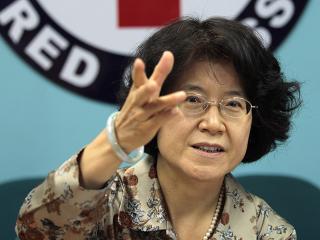From GMA News (Dec 4): PHL ignores Chinese envoy remarks on China air defense zone
Image may be NSFW.
Clik here to view.
Chinese Ambassador Ma Keqing gestures as she answers questions from reporters at Philippine Red Cross headquarters in Manila on Monday. Ma said it is the sovereign right of her country to establish a new maritime air defense zone over the East China Sea and replicate the move over another disputed region. US on Tuesday urged China to lower tension in the disputed Asian region. AP Photo/Aaron Favila
The Department of Foreign Affairs has shrugged off a remark byChina ’s envoy to the Philippines who said that Beijing
In another bold move to assert its territorial claim,China recently imposed an Air Defense Identification Zone over the East China Sea, the site of a group of islands it is disputing with Japan
The US, Australia, Japan and the Philippines refused to recognize the zone as it fueled fears that a similar move may be established in the South China Sea – a resource-rich disputed body of water called West Philippine Sea by Manila.
China’s persistent incursions and massive claim to the South China Sea, including areas that are within the West Philippine Sea, has prompted Manila to challenge Beijing’s assertion before an international tribunal.
China refused to join the arbitration, saying the basis of Manila’s arguments are groundless.
Image may be NSFW.
Clik here to view.

Chinese Ambassador Ma Keqing gestures as she answers questions from reporters at Philippine Red Cross headquarters in Manila on Monday. Ma said it is the sovereign right of her country to establish a new maritime air defense zone over the East China Sea and replicate the move over another disputed region. US on Tuesday urged China to lower tension in the disputed Asian region. AP Photo/Aaron Favila
The Department of Foreign Affairs has shrugged off a remark by
In another bold move to assert its territorial claim,
The US, Australia, Japan and the Philippines refused to recognize the zone as it fueled fears that a similar move may be established in the South China Sea – a resource-rich disputed body of water called West Philippine Sea by Manila.
“We view this as a hypothetical circumstance which does not merit our comment,” Foreign Affairs spokesman Raul Hernandez said.
Chinese Ambassador Ma Keqing said “where and when to set up the new air identification zone is within the decision of the Chinese government” and depends on the “actual needs and ability of China.”
Beijing said all aircraft entering China’s zone must first seek permission from Chinese authorities, warning that defensive measures will be taken against violators.
Manila called it an impediment to freedom of civil aviation.
“We would like to reiterate that the establishment of the ADIZ in the East China Sea by China transforms an entire air zone into its domestic airspace, infringes on the freedom of flight in international airspace and compromises the safety of civil aviation and national security of affected states,” Hernandez said.
“We have called on China to ensure that its actions should not jeopardize regional security and stability.”
Washington has advised American carriers to comply so as not to jeopardize the safety of passengers.
Competing claims to the South China Sea, a strategic waterway believed to be sitting atop huge gas and oil deposits, by the Philippines, China, Vietnam, Malaysia, Brunei and Taiwan have sparked occasional violence and now regarded as a potential regional flashpoint for armed conflict.
China’s persistent incursions and massive claim to the South China Sea, including areas that are within the West Philippine Sea, has prompted Manila to challenge Beijing’s assertion before an international tribunal.
China refused to join the arbitration, saying the basis of Manila’s arguments are groundless.
